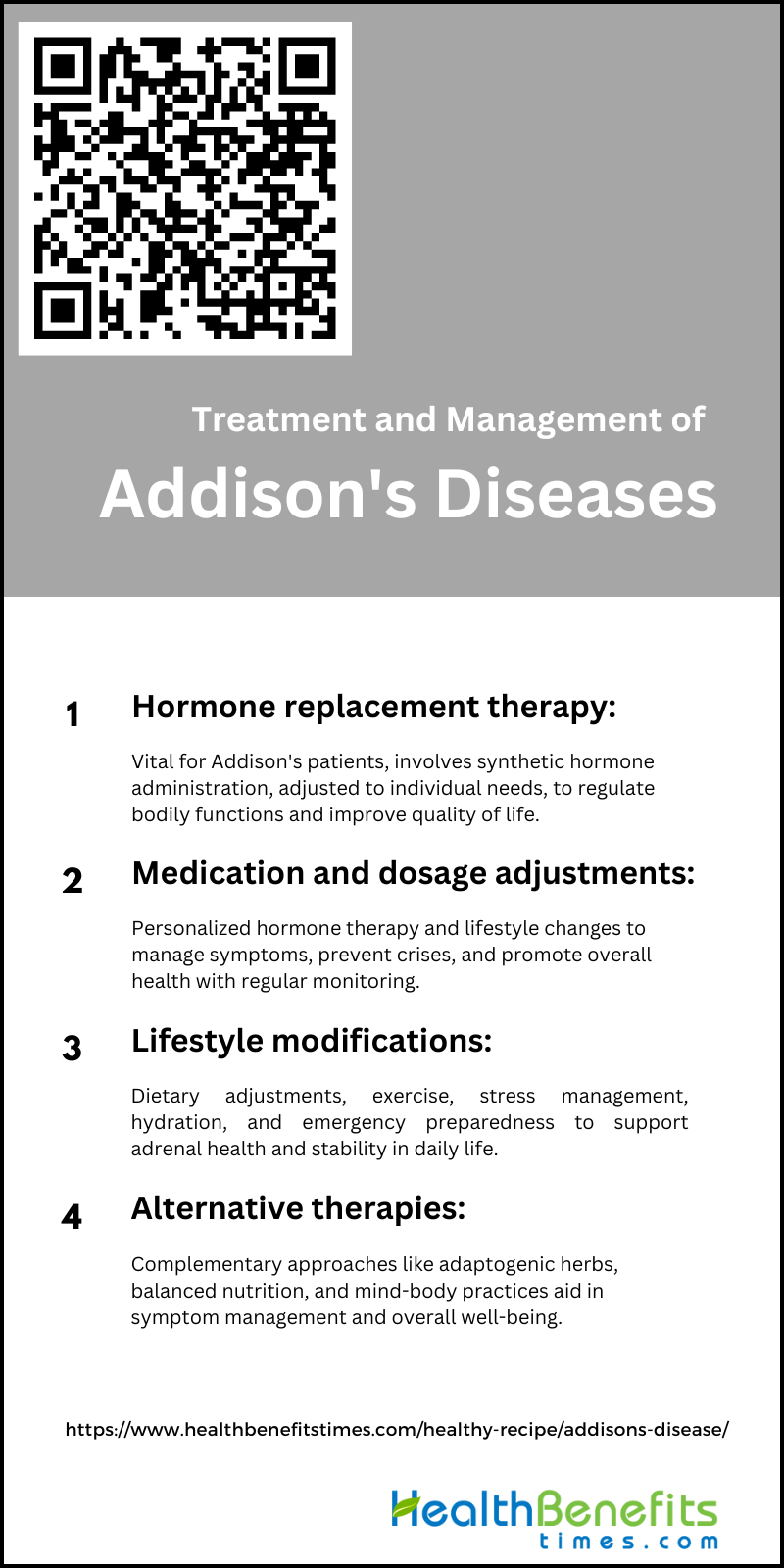Addison’s disease, also known as primary adrenal insufficiency, is a rare disorder in which the adrenal glands do not produce essential hormones such as cortisol and aldosterone. This results in symptoms such as fatigue, muscle weakness, and low blood pressure. The disease often presents with nonspecific symptoms, making diagnosis challenging and potentially impacting quality of life if not promptly identified and managed. Understanding Addison’s disease is important for recognizing the importance of hormonal balance and the intricate functions of the body. Taking an integrative approach to wellness can aid in creating personalized management strategies to help individuals maintain internal balance and prevent potential complications.
Types of Addison’s disease
Addison’s disease is characterized by inadequate production of essential hormones by the adrenal glands, resulting in various forms with unique triggers and treatment implications. Knowledge of the different types of Addison’s disease is crucial for customizing effective management strategies and providing optimal patient care. In this article, we explore the main classifications of the condition, highlighting their specific characteristics and causes.
1. Primary adrenal insufficiency
According to article, Primary adrenal insufficiency occurs when the adrenal glands located above the kidneys are compromised, resulting in a deficiency of crucial hormones like cortisol and aldosterone. This deficiency is frequently caused by an autoimmune attack on the adrenal cortex and can present as chronic fatigue, muscle weakness, and changes in skin pigmentation. Impacting a small percentage of the population, it interferes with stress management and blood pressure regulation. Adopting a holistic health approach, which incorporates personalized nutrition, stress management, and natural supplements, alongside standard hormone therapies, can aid in restoring equilibrium and enhancing overall well-being for individuals affected by this condition.
2. Secondary adrenal insufficiency
Secondary adrenal insufficiency is a specific form of dysfunction of the adrenal glands that is caused by inadequate production of ACTH by the pituitary gland. ACTH is essential for the production of cortisol. Unlike primary adrenal insufficiency, which results from direct damage to the adrenal glands, secondary insufficiency is often due to pituitary issues such as tumors, surgery, or long-term steroid use. Common symptoms include fatigue, weight loss, and muscle weakness. However, unlike primary adrenal insufficiency, secondary insufficiency typically does not result in hyperpigmentation or high levels of potassium. Holistic health approaches for managing this condition may include stress management, a balanced diet, and potentially hormone replacement therapy, all of which should be done under the supervision of a healthcare professional to promote overall endocrine health.
3. Tertiary adrenal insufficiency
Tertiary adrenal insufficiency, a less common variant of Addison’s disease, is caused by an imbalance in the hypothalamic-pituitary-adrenal axis due to inadequate production of corticotrophin-releasing hormone (CRH) by the hypothalamus. This condition is often triggered by prolonged use of external glucocorticoids, resulting in decreased adrenocorticotropic hormone (ACTH) from the pituitary gland and subsequently low cortisol levels. Symptoms such as fatigue, weight loss, and low blood pressure are similar to those seen in primary adrenal insufficiency. Holistic management strategies aim to restore hormonal balance, promote stress reduction, and offer nutritional guidance to support the body’s natural equilibrium.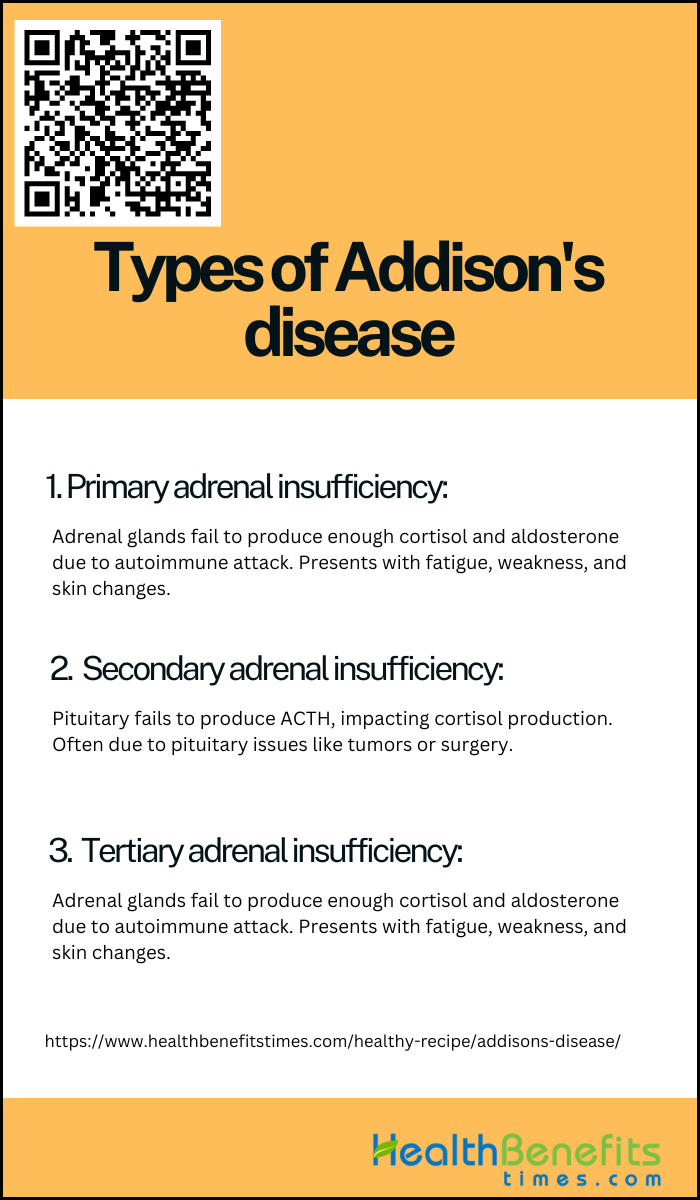
Causes and Risk Factors of Addison’s disease
The most common cause is an autoimmune response in which the body mistakenly attacks its own tissues. Other risk factors include infections, genetic predisposition, and certain medications. Understanding these causes is crucial for effectively managing and treating this chronic condition.
1. Glucocorticoids
Glucocorticoids are essential steroid hormones, such as cortisol, that play a crucial role in regulating metabolism, immune function, and response to stress. In Addison’s Disease, insufficient production of these hormones by the adrenal glands results in symptoms that necessitate careful treatment with medications like hydrocortisone. Factors such as autoimmune disorders, infections, and genetics can elevate the likelihood of developing this condition, underscoring the importance of awareness and early intervention. A comprehensive health strategy, which includes individualized medical advice and frequent monitoring, is essential for effectively managing Addison’s disease and promoting overall well-being.
2. Mineralocorticoids
Addison’s disease, also known as primary adrenal insufficiency, occurs when the immune system mistakenly attacks the adrenal glands, resulting in a severe deficiency of mineralocorticoids, particularly aldosterone. This hormonal imbalance disrupts the body’s ability to regulate salt and water levels, crucial for maintaining stable blood pressure and can lead to symptoms such as dehydration, hypotension, and cravings for salt. Identifying risk factors such as autoimmune disorders, genetic predisposition, and infections is crucial for early detection and treatment, which is essential for holistic health strategies that focus on achieving hormonal balance for overall wellness.
3. Androgens
Addison’s Disease affects the adrenal glands, resulting in a decrease in the production of essential hormones such as cortisol, aldosterone, and androgens like dehydroepiandrosterone (DHEA). This hormonal imbalance can lead to symptoms in both men and women, with women potentially experiencing reduced libido, fatigue, and hair loss. Androgens play a crucial role in overall health, muscle strength, and vitality, beyond just male characteristics. A comprehensive health approach recognizes the importance of androgens and the necessity of understanding the various manifestations of Addison’s Disease, highlighting the significance of these hormones in maintaining well-being and the body’s complex hormonal system.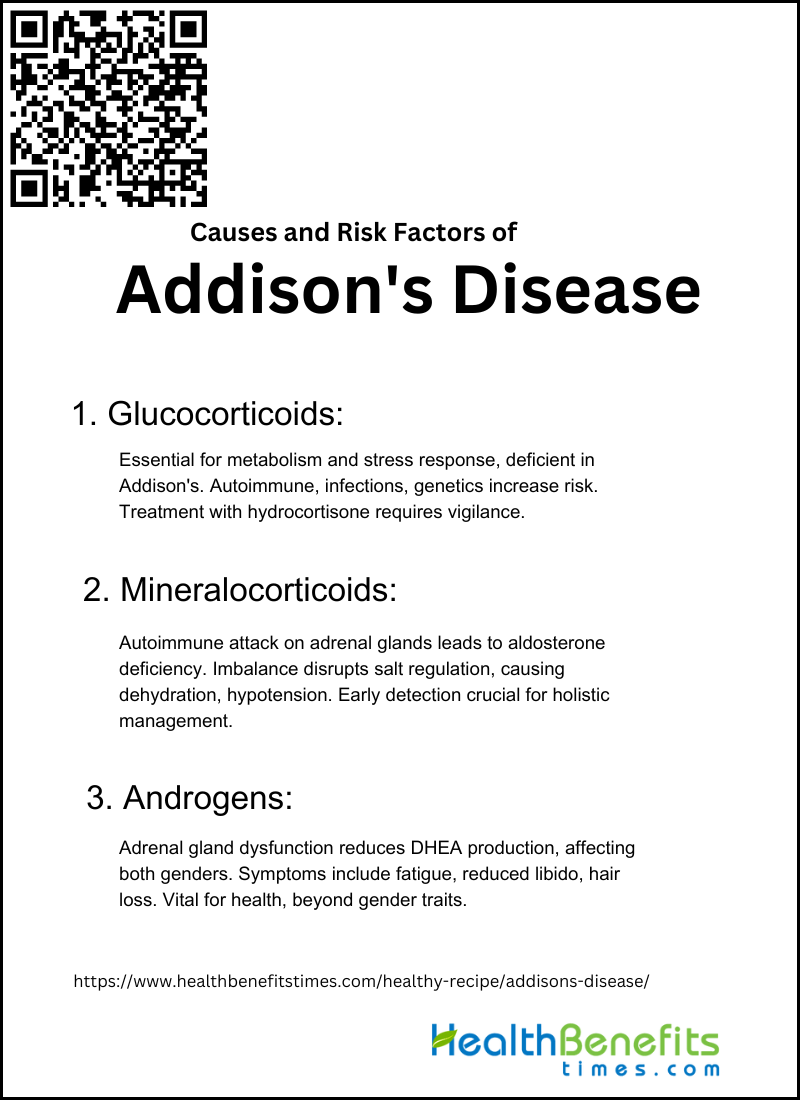
Symptoms and Diagnosis (DND) of Addison’s disease
Addison’s disease is a rare but serious disorder of the adrenal glands that often manifests with subtle symptoms that may be easily missed. Recognizing these signs is essential for prompt diagnosis and management of the condition. In the following sections, we explore the key symptoms and diagnostic procedures that are crucial for identifying Addison’s disease.
1. Fatigue and weakness
Addison’s disease is characterized by the adrenal glands’ inability to produce adequate hormones, resulting in persistent fatigue and weakness that can significantly affect daily life. This unrelenting exhaustion, often not alleviated by rest, along with muscle weakness, can impede normal activities and overall health. Early detection and treatment are crucial in the field of holistic health. It is important to consult with a healthcare provider for specific tests, including blood work and stimulation tests, to ensure a prompt diagnosis. Effective management usually includes hormone replacement therapy and lifestyle changes tailored to promote the individual’s health and well-being.
2. Weight loss and decreased appetite
Weight loss and decreased appetite are caused by the adrenal glands’ insufficient production of hormones. These symptoms, along with fatigue, muscle weakness, irritability, and depression, may go unnoticed or be mistaken for less serious health issues. However, they indicate the body’s difficulty in carrying out normal metabolic functions. It is important for individuals experiencing these changes to promptly seek medical attention, as early detection and treatment are essential for maintaining health. Holistic health perspectives emphasize the significance of listening to the body’s signals and adopting a comprehensive approach to care that addresses both physical and emotional well-being. This approach integrates medical interventions with lifestyle modifications for overall wellness.
3. Low blood pressure and dizziness
Low blood pressure and dizziness, especially upon standing, are serious health conditions caused by the adrenal glands’ insufficient production of cortisol and aldosterone—hormones essential for regulating blood pressure and electrolyte balance. These deficiencies can lead to symptoms such as weakness, weight loss, and cravings for salt, potentially progressing to an adrenal crisis if left untreated. Diagnosis of this condition involves a comprehensive approach, including blood tests to assess levels of sodium, potassium, cortisol, and ACTH, as well as an ACTH stimulation test to evaluate adrenal function. Early detection and accurate diagnosis are crucial in the management of Addison’s disease, enabling timely intervention with hormone replacement therapy and the implementation of appropriate holistic and medical treatments to prevent severe complications.
4. Hyperpigmentation of the skin
Hyperpigmentation, the darkening of specific areas of the skin, is a significant indicator of Addison’s disease, a severe health condition characterized by insufficient production of essential hormones by the body. This darkening is particularly prominent on sun-exposed regions such as the face and neck, as well as on pressure points like elbows and knees, and even on the gums and oral mucosa. The increased production of melanocyte-stimulating hormone occurs due to malfunctioning adrenal glands. Early detection of this symptom is crucial, as untreated Addison’s disease can lead to fatal consequences. If you notice unusual changes in your skin color, it is important to seek medical attention. A doctor may conduct an ACTH stimulation test and review your medical history to confirm the presence of Addison’s disease. Early detection and a comprehensive treatment approach, which may involve a combination of therapies, can effectively manage the disease and prevent further complications.
5. Nausea, vomiting or diarrhea
Nausea, vomiting, and diarrhea are not only distressing symptoms however may also be early indicators of Addison’s disease, a rare condition resulting from inadequate hormone production by the adrenal glands. These symptoms, which can be easily confused with a stomach bug or food poisoning, indicate a deeper hormonal imbalance involving cortisol and aldosterone that impacts the body’s essential functions, including food digestion and absorption. It is crucial for individuals experiencing these persistent symptoms to seek medical attention for a proper diagnosis, typically through blood tests and imaging studies. Early recognition of Addison’s disease is essential for initiating a treatment plan that not only addresses the immediate physical symptoms but also considers the overall health of the individual, with the goal of restoring wellness and preventing serious complications such as dehydration.
6. Muscle weakness
Muscle weakness, a common indicator of Addison’s disease, can significantly affect one’s ability to carry out daily tasks, such as climbing stairs or rising from a chair. This condition stems from the adrenal glands’ failure to produce adequate levels of essential hormones, particularly cortisol and aldosterone. Early detection and management of muscle weakness are essential for improving the quality of life for those with Addison’s disease. Diagnosing this disorder requires specific tests, including blood tests, the ACTH stimulation test, and sometimes imaging studies, to confirm hormone deficiencies and assess adrenal gland function. A holistic approach to health, integrating a nutritious diet, stress reduction, and tailored exercise, alongside conventional hormone replacement therapy, is key to supporting muscle function and enhancing overall well-being in affected individuals.
7. Salt cravings
Cravings for salt are a prominent and indicative symptom of Addison’s disease. These cravings occur as the body attempts to compensate for the loss of sodium, which is excreted in urine due to decreased levels of the hormone aldosterone. Individuals with Addison’s disease may experience an increased desire to consume salty foods or add extra salt to their meals. Recognizing these cravings is crucial, as they may necessitate medical evaluations such as blood tests and ACTH stimulation tests to confirm the diagnosis. From a holistic health perspective, it is important to consider these cravings as significant indicators that warrant medical attention and could help guide prompt treatment and management of Addison’s disease.
8. Dehydration
Dehydration is a key indicator of Addison’s disease, where the adrenal glands fail to produce enough hormones, disrupting the body’s salt and water regulation. This deficiency often leads to symptoms such as persistent thirst, dry mouth, low blood pressure, and decreased skin turgor. Diagnosing Addison’s disease involves checking electrolyte levels, hormone concentrations, and performing an ACTH stimulation test to gauge adrenal function. It’s crucial for individuals showing these signs to get medical help promptly to manage the condition and avert severe adrenal crises. Embracing a holistic health perspective, maintaining proper hydration and electrolyte balance is also fundamental to the overall well-being of those with Addison’s disease.
9. Low blood sugar levels (especially in children)
In children, low blood sugar levels can be an indicator of Addison’s disease, a condition characterized by insufficient hormone production in the adrenal glands, leading to disruptions in glucose metabolism and insulin secretion. Symptoms such as fatigue, irritability, muscle weakness, and confusion may manifest, serving as subtle yet important signs of this hormonal imbalance. It is crucial not to ignore these signs, as they require prompt medical assessment, including blood tests for cortisol and ACTH levels, as well as an ACTH stimulation test. Taking a holistic approach to health, it is essential for parents and caregivers to recognize these early indicators in order to seek comprehensive care that promotes the child’s physical and emotional well-being, ensuring stable blood sugar levels and overall health.
10. Irregular or no menstrual periods in women
Women may experience irregular or absent menstrual periods as a symptom of Addison’s disease, a rare condition in which the adrenal glands do not produce sufficient essential hormones such as cortisol and aldosterone. These hormonal imbalances can result in disruptions to the menstrual cycle, as well as other symptoms including fatigue, weight loss, low blood pressure, and skin darkening. Early recognition of these signs is crucial for prompt diagnosis, typically confirmed through blood tests, hormonal assessments, and sometimes additional imaging studies or an ACTH stimulation test. For individuals experiencing such symptoms, it is important to consult a healthcare provider for proper diagnosis and initiation of appropriate treatment. Taking a holistic approach to health, it is essential to monitor these bodily changes and seek medical advice to effectively manage and treat the underlying condition.
11. Mood swings, mental confusion or loss of consciousness
Addison’s disease can have a profound impact on both mental and physical health, presenting symptoms such as mood swings, mental confusion, and even loss of consciousness. These subtle signs, including unexplained irritability, depressive episodes, and difficulty concentrating, are important indicators of the body’s struggle with reduced adrenal hormone production, particularly cortisol. If not promptly diagnosed, the condition can lead to serious complications, such as adrenal crises. Diagnosis typically involves blood tests and hormonal evaluations to identify hormone deficiencies, as well as imaging studies to assess the adrenal glands. A comprehensive treatment approach is crucial, addressing both the physical symptoms and the psychological effects to enhance the overall quality of life for individuals affected by Addison’s disease.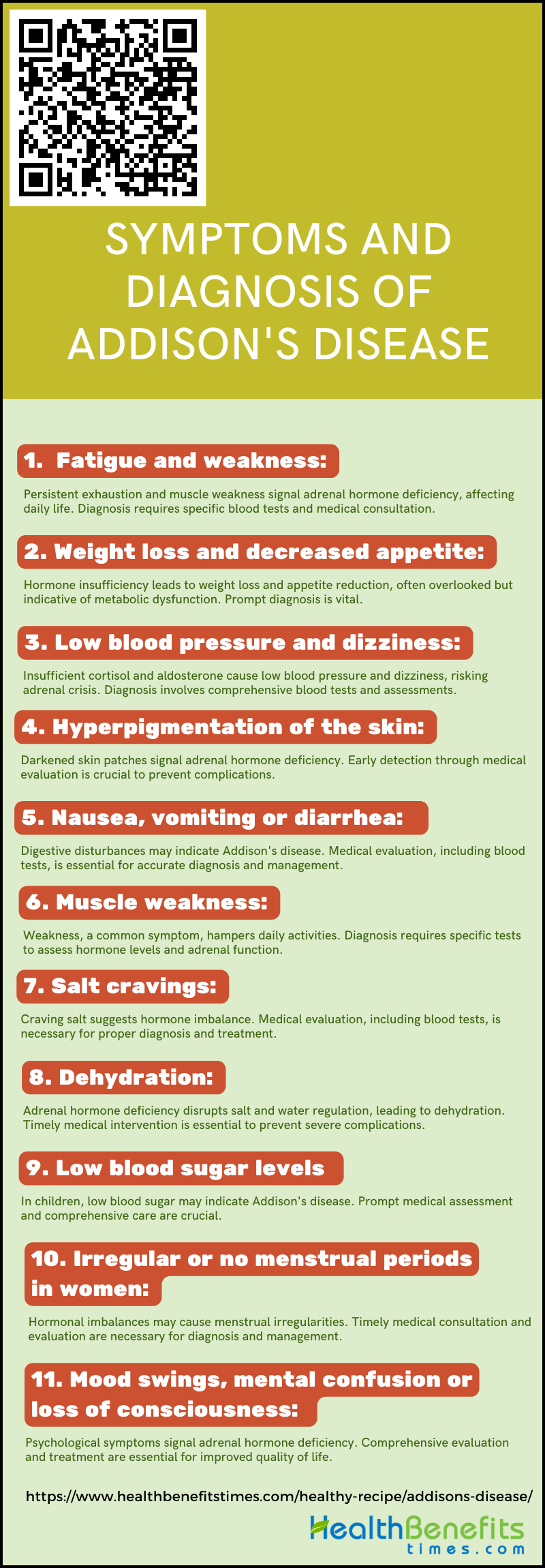
Tests to diagnose Addison’s disease
Understanding Addison’s disease and its impact on well-being is essential. Healthcare professionals rely on a series of specific tests to accurately diagnose this condition, assessing adrenal function and detecting abnormalities. The following is a list of key diagnostic tests used to confirm the presence of Addison’s disease, each playing a crucial role in guiding treatment and holistic health management.
1. Blood tests
Blood tests are essential for diagnosing Addison’s disease, a condition in which the adrenal glands do not produce enough hormones. These tests specifically measure cortisol and adrenocorticotropic hormone (ACTH) levels, which are crucial for assessing adrenal function. In individuals with Addison’s disease, low cortisol and high ACTH levels are typically observed, with the latter indicating the adrenal glands’ decreased performance. Additionally, these tests assess sodium, potassium, and antibodies to identify potential autoimmune involvement. For healthcare professionals, understanding these biomarkers is essential for developing a comprehensive wellness plan that addresses symptoms and restores the body’s balance, emphasizing preventive healthcare and overall well-being.
2. ACTH stimulation test
The ACTH stimulation test, also known as the cosyntropin test, is a crucial diagnostic tool used to detect adrenal insufficiency and Addison’s disease. This test assesses the adrenal glands’ ability to produce cortisol, a hormone essential for regulating metabolism, in response to synthetic ACTH. Healthcare professionals typically administer cosyntropin intravenously and then measure cortisol levels before and after 30 to 60 minutes. A normal response is characterized by a significant increase in cortisol levels, while a suboptimal increase may indicate Addison’s disease or other forms of adrenal insufficiency. This test is considered the gold standard due to its accuracy, allowing healthcare providers to create personalized wellness plans that support adrenal and endocrine health.
3. Insulin-induced hypoglycemia test
The insulin-induced hypoglycemia test (ITT) is a crucial diagnostic tool for identifying Addison’s disease, a condition characterized by inadequate production of adrenal hormones. During the test, insulin is administered to intentionally lower blood sugar levels, triggering the body’s stress response and expecting an increase in cortisol production from the adrenal glands, which is indicative of normal adrenal function. However, in individuals with Addison’s disease, the expected surge in cortisol may be weak or absent, suggesting adrenal insufficiency. ITT is considered the gold standard for assessing the integrity of the hypothalamic-pituitary-adrenal (HPA) axis, but it must be conducted under medical supervision due to the potential risks of induced hypoglycemia. The results of the test are essential for healthcare providers to develop personalized, comprehensive health plans tailored to the specific needs of individuals with Addison’s disease, promoting overall wellness and fitness.
4. X-ray, MRI or Computed tomography (CT scan)
In diagnosing Addison’s disease, imaging tests such as X-rays, MRI, and CT scans are essential but supportive tools that complement clinical assessments. These tests provide a detailed look at the adrenal glands, revealing any structural irregularities like shrinkage, tumors, or calcifications that could indicate the disease or past infections like tuberculosis. While a CT scan offers a clear image of the adrenal glands, an MRI is favored for its enhanced soft tissue contrast, making it easier to spot any subtle abnormalities. Together, these imaging techniques form a vital part of a holistic health strategy, ensuring a thorough evaluation of adrenal health and aiding in the delivery of personalized care for those with Addison’s disease.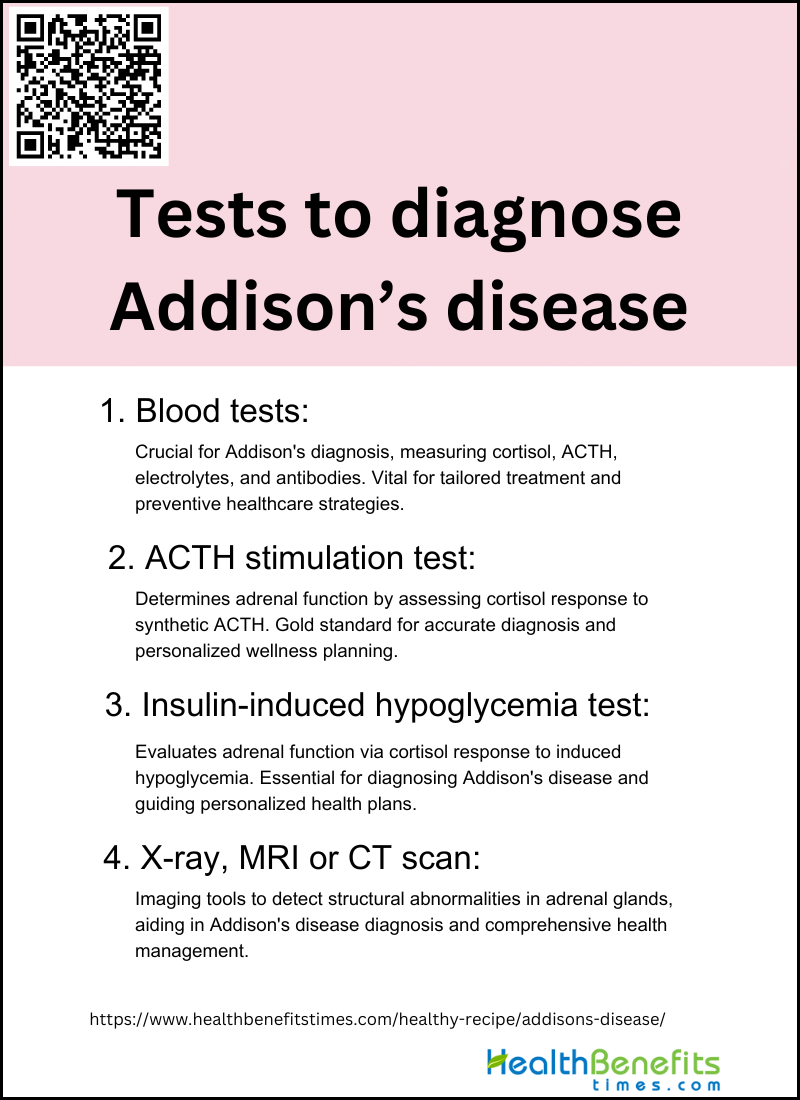
Treatment and Management of Addison’s Disease
Addison’s disease is a chronic condition characterized by inadequate hormone production from the adrenal glands, necessitating lifelong management and careful treatment. Patients commonly depend on hormone replacement therapy to sustain normal bodily functions and prevent adrenal crises. Proficiency in managing this condition can greatly improve quality of life and overall health.
1. Hormone replacement therapy
Hormone replacement therapy is crucial for managing Addison’s disease, a rare disorder characterized by low levels of adrenal hormones. The treatment involves the administration of synthetic hormones such as hydrocortisone and fludrocortisone, which are customized to meet the individual needs of each patient. These hormones play a vital role in regulating blood pressure, maintaining the balance of salt and water in the body, and responding to stress. Dosages are adjusted in response to stress or illness to closely mimic the natural fluctuations of hormones in the body. Through regular monitoring and collaboration with healthcare providers, this therapy effectively controls the symptoms of Addison’s disease, significantly improving the quality of life for patients and allowing them to lead an active, healthy lifestyle.
2. Medication and dosage adjustments
Managing Addison’s disease involves a careful balance of medication and lifestyle adjustments to maintain health. Treatment primarily includes hormone replacement therapy with medications such as hydrocortisone or prednisone for cortisol, and fludrocortisone for aldosterone, which are necessary to compensate for the adrenal glands’ inability to produce these hormones. Dosages are personalized and may need to be adjusted in response to stress, illness, or surgery to prevent an adrenal crisis. Patients must actively monitor their health and collaborate with healthcare providers to modify treatment as necessary to fit their daily life and stressors. Additionally, incorporating a holistic approach that focuses on proper nutrition, stress reduction, and regular exercise can greatly improve the quality of life for individuals with Addison’s disease. Regular appointments with an endocrinologist are essential to maintain hormone levels and manage the condition long-term.
3. Lifestyle modifications
Managing Addison’s disease, an adrenal insufficiency, goes beyond medical treatments to include important lifestyle adjustments that support overall health. A diet high in sodium is necessary, especially during strenuous activity or in hot climates, to replace the salt lost due to this condition. Foods like salted nuts, eggs, and cheese can help maintain electrolyte balance. Exercise is beneficial for strength and stress management, but it should be kept at a moderate level to prevent fatigue. Practices such as meditation, yoga, and deep breathing are helpful in reducing stress-related symptom flare-ups. It is also important for individuals to stay hydrated, control their salt intake, maintain a regular sleep schedule, and wear medical alert jewelry. Carrying emergency glucocorticoid medication is a precaution against potential adrenal crises. By incorporating these strategies, individuals with Addison’s disease can lead a more stable, health-focused lifestyle.
4. Alternative therapies
In the comprehensive management of Addison’s disease, alternative therapies are used in conjunction with traditional hormone replacement therapy to support adrenal function and overall health. Adaptogenic herbs, such as ashwagandha and licorice root, are employed for their potential to regulate cortisol levels and enhance the body’s response to stress. A balanced diet, supplemented with B-vitamins, vitamin C, magnesium, and increased salt intake, addresses nutritional requirements and counteracts the low blood pressure associated with the condition. Adequate intake of calcium and vitamin D is also crucial for preserving bone health in patients receiving corticosteroid therapy. Furthermore, mind-body practices like yoga and meditation are recommended for stress management, which can exacerbate symptoms of Addison’s disease. It is imperative for patients to consult healthcare professionals before incorporating any alternative therapies to ensure their safe integration with conventional treatments and optimize disease management.